Editorial Opinion | Nicole Krawcke
Want to retain employees? Give them a reason to stay
New company provides unique incentives for employee retention in the skilled trades.

The Reins team poses for a photo in front of their booth at Nexstar Network’s Super Meeting, held Sept. 24-27 in Orlando, Florida. Photo courtesy of Reins
In any small business, retaining skilled employees is important for long-term success. For plumbing and HVAC contractors, it’s not just important — it’s crucial to success. High turnover rates can lead to costly disruptions, lost productivity and diminished customer satisfaction. To combat this, many home service contractors are exploring innovative ways to incentivize their workforce to stay.
One new company is offering a unique path to employee retention. Reins was founded just last year by Chris Buttenham and his partner. The company is focused on helping small businesses incentivize their most valuable contributors through phantom stock and profit-sharing plans. I had the chance to meet Buttenham and chat with him during the Strategic Partner Trade Show at Nexstar Network’s Super Meeting last month.
“This is mine and my cofounder's second company,” Buttenham says. “We started an AI software company previously and sold it in 2021. And when we sold it, we realized we didn’t want to sell software to software companies anymore. After researching what the next problem would be that we would solve, we fell in love with the idea of helping small, local businesses. My dad is a small business owner, and the inspiration mostly came from him. He had been trying to step away from the business, and he had a general manager to whom he was trying to give an actual piece of the company. I watched him struggle to do that and saw the lack of tools out there to help him with that.
“In the back of my head, we come from the tech world where when you join a technology company or any large company, usually, you get a stock option grant the minute you join,” he continues. “But for the millions of businesses that really hold up the economy in the U.S., there’s really no tools available. And we learned it’s for a lot of innocent reasons — there’s a lot of tax complexities that deal with LLCs, the way these companies are typically structured versus a C-corp, like the tech companies. So we decided to build it.”
The term “Phantom Stock” raises eyebrows — mine certainly were when I read it for the first time. Reins prides itself in demystifying the whole process for contracting business owners.
“It’s a terrible name for a great benefit,” Buttenham explains. “We’re trying to rebrand it, so we created our own framework called MARE — Modern Agreement for Rewards and Equity. We call it MARE Stock and MARE Profit.
“Phantom Stock is essentially a deferred form of compensation,” he continues. “All it is, is a fancy cash bonus that is usually linked to the value of company stock. So it gives the benefits of stock ownership without any of the headache. When you would traditionally give someone equity, it creates a taxable event. It creates compliance requirements for the employer. With Phantom Equity, none of that exists. So it makes it easy to give skin in the game when it wasn’t accessible before.”
MARE Profit is Reins' proprietary profit-sharing plan, tailored to meet small business needs for short-term cash distributions. Both plans can be customized to fit the needs of the business.
“Contracting businesses employ skilled, desk-less workers,” Buttenham says. “They are usually in high demand and low supply, so it’s hard to retain them because they have a lot of options. A lot of these businesses, we hear, are tapped out on salary, so they need to find unique ways of incentivizing these workers. The combination of the Phantom Equity, which is what we call the long-term incentive, and the Profit Sharing, which is the short-term incentive, creates a nice retention mechanism and gives them upside in the thing they’re helping build every day.”
Buttenham notes that many of Reins’ current skilled trades clients are using both plans, but in different ways.
“MARE Stock is usually for your key employees — your general manager, managers, lead technicians and that sort of thing,” he says. “A lot of these customers will do MARE Profit for a much larger portion of the workforce, and they will use MARE Stock as a further incentive. So if an employee reaches a certain amount of tenure or they hit a milestone, they will also receive MARE Stock. So MARE Stock is kind of the crème de la crème incentive. And we see MARE Profit more widely used because you’re not giving a piece of the company away.”
And if a company already has a short-term incentive program set up, Reins can come in and help legitimatize it and bring in some visibility, Buttenham explains.
“We are technologists and we’ve used technology to make this more efficient, more effective and more affordable for these business owners, but we take a human approach to it,” he adds. “So we leverage technology to get the stuff humans shouldn’t do out of the way, then we step in and help with plan design. There are also a lot of free resources on our website. On the outside, this can look confusing. But we make it simple.”
As Buttenham says, “We operate under the assumption that equity works because it has in every industry currently using it. It just hasn’t been widely available in the skilled trades until now.”
If you’re interested in learning more about MARE Stock and Profit options, visit www.myreins.com.
Looking for a reprint of this article?
From high-res PDFs to custom plaques, order your copy today!






